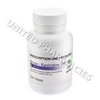Customers also like
Rabicip (Rabeprazole Sodium) - 20mg (15 Tablets)
from only £6.16
Arrow-Ranitidine (Ranitidine Hydrochloride) - 150mg (250 Tablets)
from only £18.57
Losec (Omeprazole) - 20mg (30 Capsules)
from only £25.64
Ranitidine Relief (Ranitidine Hydrochloride) - 150mg (500 Tablets)
from only £49.42
Nexium (Esomeprazole Magnesium) - 40mg (28 Tablets)
from only £14.47
Description
| Main Use | Active Ingredient | Marketed Name |
| Stomach and oesophagus problems | Rabeprazole Sodium | Rabicip |
Uses
Rabicip (Rabeprazole Sodium) decreases acid production in the stomach. This makes it effective at treating Zollinger-Ellison syndrome, gastroesophageal reflux disease (GERD) and ulcers. It can also help to allow the oesophagus to heal in patients affected by GERD, while preventing any further damage being done to it. It may even help to prevent cancer of the oesophagus. This drug belongs to a group of medicines commonly referred to as proton pump inhibitors.
Dosage and Administration
Rabicip (Rabeprazole Sodium) tablets are taken by mouth. In the vast majority of cases, patients are told to take it once per day. If you are treating ulcers, your doctor may tell you to take it after breakfast or the first meal of the day. Treatment of other conditions may require different dosage instructions. For this reason, it is necessary to see your doctor before starting treatment, so that your condition can be fully evaluated and the correct dosage schedule can be prescribed for you.
Side effects
Some side effects which may occur when taking Rabicip (Rabeprazole Sodium) tablets include:
- Headache
- Insomnia
- Anxiety
- Itching sensation
- Sore throat
Serious side effects which require immediate medical care include seizures, muscle spasms, severe diarrhoea, bloody stools and dizziness. In addition to the reactions listed here, other adverse effects may occur. See your doctor straight away if this occurs.
Precautions
Proton pump inhibitors (a class of medications) such as this drug can sometimes increase the chances of bone fractures. You are advised to discuss this risk with your doctor before you start taking this drug.
Before you begin taking this drug, you must inform the prescribing doctor if you have a history of suffering from liver disease.
Seek immediate emergency medical attention if you suffer an allergic reaction. Symptoms to watch for, which may be indicative of a reaction, include skin rashes, hives, swelling of the face or limbs, trouble breathing, and trouble swallowing.
Always use Rabicip (Rabeprazole Sodium) as you have been prescribed by your doctor. Never self-medicate or change your dosage without first consulting your doctor. The correct dosage can vary depending on your health, medical history, and the severity of the condition being treated.
This medication may not be safe for all patients. Before you begin using it always disclose the following to your doctor:
- If you are pregnant or breastfeeding.
- If you suffer from any allergies.
- If you suffer from any other health conditions or illnesses.
- If you are using any other medicine (including all non-prescription).
- If you are using any supplements, vitamins, or herbal products of any kind.


-Tab-10mg-UK-1.jpg)
-Tab-20mg-UK-1s.jpg)

-Cap-20mg-UK-1s.jpg)
-Tab-150mg-UK-1s.jpg)
-Tab-40mg-UK-1s.jpg)
-Tab-10mg-UK-1s.jpg)
-Tab-10mg-UK-2s.jpg)


